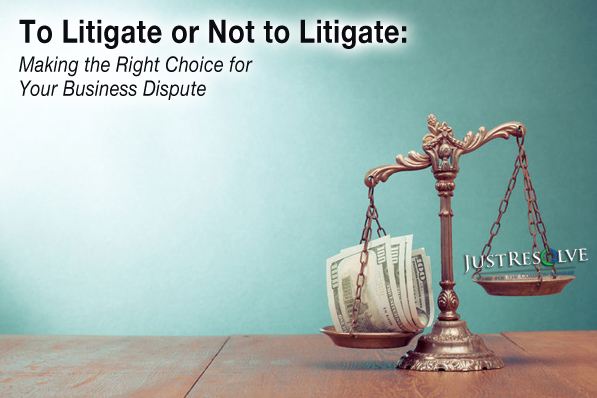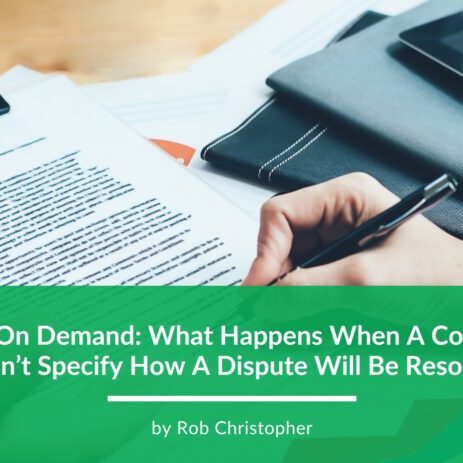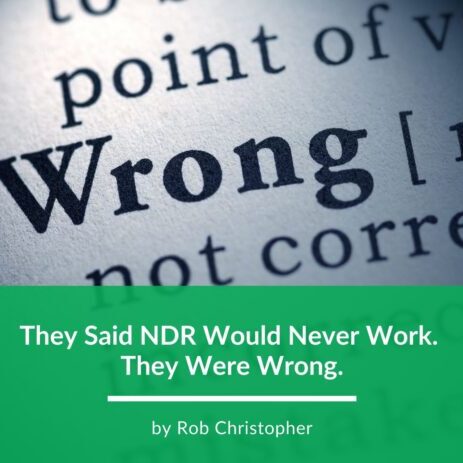Using a Neutral Driven Approach Instead of Litigation

Far too often, businesses turn to litigation for disputes that simply do not require the amount of time and money that litigation demands. Even more discouraging is that due to rising costs and other inefficiencies, arbitration has become “litigation lite.” Today, there are alternatives that may be better suited for parties, especially for disputes where major stakes are not at play and the parties have no desire to set future precedent. One alternative is a neutral-driven approach allowing parties the opportunity to select a neutral arbiter to guide them through a non-adversarial process. This neutral-driven approach often ends up significantly more efficient, time and cost-wise.
Litigation, as any lawyer knows, is almost never the most time-efficient — and never the cheapest — solution. Perhaps the most compelling example of this inefficiency comes from a recent study of employment law cases. The study found that employment lawyers require at least a $60,000 claim to willingly litigate a case. Consequently, 95% of individual employees seeking representation are immediately turned away as they do not reach the necessary threshold for a lawyer to accept their case. When the costs of litigation approach or even exceed the stakes, it can undermine or preclude real justice from occurring.
While there are some expected costs associated with litigation, such as court filing and attorney’s fees, there are other hidden costs that can be just as expensive but are often not pondered by parties considering litigation. One of these hidden costs is the lost or distracted time that a businessperson faces when confronted with the requirements of litigation. Litigation is a time-consuming process. Instead of working on profit-minded aspects of their business, parties spend that time giving depositions and producing evidence.
Delay in litigation comes from overbooked court dockets and insufficient use of alternative dispute resolution (ADR) methods. Evidence shows that if a party is simply seeking its day in court, avoiding litigation entirely best provides him the opportunity. For instance, due to the costs associated with litigation, only 1.1% of civil cases filed in federal court ever make it to trial while 50% of claims in American Arbitration Association (“AAA”) make it to a hearing before an arbitrator.
The main difference in cost is the substantially increased amount of discovery required by litigation as compared to ADR services. Not only does this discovery serve as another hidden and expensive cost, but, similar to delay in litigation, it takes away from time the parties could be better spending elsewhere.
On the other hand, a neutral-driven process gives parties a cheaper solution at a fraction of the price. The parties start by choosing a neutral arbiter, usually an expert on the particular subject matter in dispute, who they believe will remain neutral through the course of the proceedings. The neutral is then placed in charge of the entire process, which includes calling witnesses, combing through documents, facilitating any negotiations, and issuing a final decision. By giving the neutral ultimate authority over what is important in the case, the neutral will be able to investigate and reach a decision more quickly and with far less discovery. Since the neutrals are subject matter experts in their fields, the use of other experts may also be limited.
The benefits of this neutral process are clear as the parties are able to reach out to the neutral before incurring the time and expense of contacting attorneys. In this method, attorneys may be entirely unnecessary. At most, they serve as advisors to their clients or liaisons to the neutral in charge on behalf of their clients, turning over the necessary documentation to the neutral but providing no independent investigation or brief writing. In cases where the stakes simply do not rise to the level of a “bet the company” case, it will be in the best interest of all parties to resolve cases as cheaply and efficiently as possible.
Another major benefit of a neutral driven process is that parties are often given the opportunity to examine the strengths of their case much more economically than if they would have otherwise brought it to litigation. This can come about in one of two ways: the parties agree that the process will be non-binding and simply serve as the basis for future negotiation, or one party can reach out to the neutral for an early neutral evaluation. Early neutral evaluation gives the requesting party a chance to see what an unbiased observer thinks about the strengths and weaknesses of their case. Doing so has proven to be exceptionally valuable to parties considering pursuing a more aggressive and expensive dispute resolution service.
Parties have far too often chosen the wrong dispute resolution service for their business disputes. Business owners have far too often failed to realize that no longer is litigation or arbitration the most economical option. A dispute resolution service that gives parties access to truly neutral individuals with subject matter expertise in the area of judgment has recently gained further popularity and now serves as the most cost and time efficient alternative to litigation.
More to read
NDR on Demand: What Happens When a Contract Doesn’t Specify How a Dispute Will Be Resolved?
The best way to deter threats of litigation and minimize the costs, duration, and distractions of resolving any dispute is to put a dispute resolution clause specifying NDR — Neutral-Driven Resolution — in all your contracts BEFORE there is a problem. That means that if a dispute should arise between a business and a contractor,…
They Said NDR Would Never Work. They Were Wrong.
Many people are surprised by how effective NDR can be. Since publishing my book and speaking at events about NDR (Neutral-Driven Resolution), I’ve often been asked a simple question: Does it work? And if it really does lower the costs and the time it takes to settle common disputes, why doesn’t everybody know about…
“Morgan Hill author releases new book”
The Morgan Hill Times featured Rob’s new book in an article ahead of his “Meet the Author” night at Booksmart. “Legal disputes and conflicts cost businesses billions of dollars a year in lawyers’ fees, lost productivity, time and aggravation. A new book by Morgan Hill author Robert Christopher proposes an innovative, faster and simpler way…
Not All Disputes are Equal
Not all business and legal disputes are alike, and not all of them can be resolved in the same way. In writing my book Just Right: How Neutral-Driven Resolution Can Close the Gap in American Civil Justice, it was important to distinguish the types of common disputes for which NDR is most suitable. As readers…



